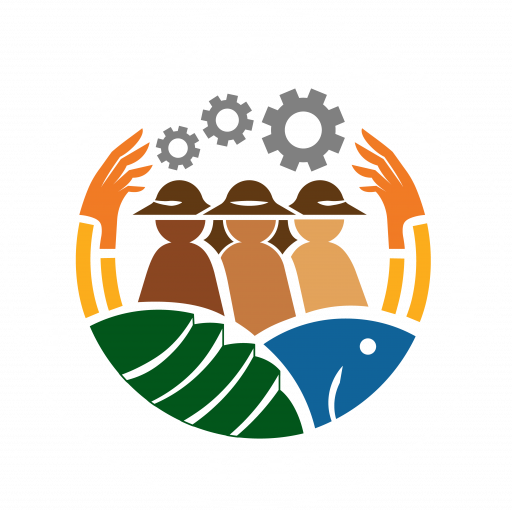“Emerging Egg Capitals” depict the successes of four farmers’ associations from the municipalities of Salug, Pres. Manuel Roxas, Mutia, and Manukan in Zamboanga del Norte province. The groups received interventions on the Layer Chicken Egg Production Project.
BACKGROUND
For the longest time, the municipality of Salug has experienced an insufficient supply of fresh eggs. Most of the suppliers come as far as Cebu and Cagayan de Oro City. It was no wonder why most often, the consumers in the locality were buying not fresh and sometimes spoiled eggs. Bakeries also were not able to bake quality cakes, pastries and bread due to the lack of farm fresh eggs. The students and working people found it difficult to cook fresh eggs for their breakfast as well.
This situation prompted the local government unit of Salug to dream of becoming the “egg basket” for the province of Zamboanga del Norte. Salug is located almost at the center of the province.
In 2017, the breakthrough came when the Department of Agriculture (DA) started the implementation of the Special Area for Agricultural Development (SAAD) Program for the top ten poorest provinces in the country. Zamboanga del Norte is one of these provinces.
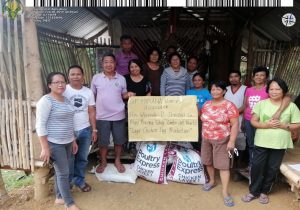
Bacong Fishermen and Farmers Association of Salug, Zamboanga del Norte
The Office of the Municipal Agriculturist recommended two (2) associations, which are the Pacuhan-Pucay and the Liguac Farmers’ Associations, to be the initial farmer-partners for SAAD Program. Their proposals are the establishment of the Egg Layer Chicken Raising Project using the “egg machines” type of the modular poultry raising. Each “egg machine” consisted of 48 laying pullets, feeder, and drinker installed with galvanized cage. The DA-SAAD granted 36 modules for the two (2) farmers’ associations.
Encouraged by the successful implementation of the project, the LGU Salug expanded the layer chicken projects to an additional two (2) associations in Barangay Bacong and Barangay Ramon Magsaysay with 38 modules of “egg machines”.
Both, the Christian-Muslim-Subanen Organization in Barangay Ramon Magsaysay and Bacong Farmers and Fishermen Association (FFA) were each given 19 modules of “egg machines”.
For all the farmer-partner associations, the DA-SAAD provided egg machines, an initial supply of feeds good for two months, one unit of a wheelbarrow, and plastic egg trays.
Aside from the material inputs, all the associations underwent various social preparation and technical training. The training activities include Organizational Management, Project Management, Financial Management, and Policy Formulation. These all aimed at strengthening the capacity of the farmer-partners for community-managed projects.
INNOVATIONS/GOOD PRACTICES
“Bayanihan” spirit is alive in the villages where the egg layer projects are implemented. In Bacong, all the members tend to their poultry project on a rotational basis. They hired a permanent caretaker but a team of two or three members of the association renders daily duty to assist in cleaning the poultry area, feeding the layer chicken, and harvesting eggs. This practice paid off resulting in good poultry farm management as well as maintenance of cleanliness and hygiene in the surrounding. As a result, the members took pride in their project and had strong ownership of the livelihood endeavor. They are not just recipients or beneficiaries. They are real owners.
The presence of the member-volunteers has multiple impacts on the project. The association has instituted timely and correct farm production records and sound bookkeeping practices. Also, pilferage as well as entry of predators like dogs, wild cats and snakes are prevented.
The association strictly observes regular meetings. All production output and sales are reported during the meeting. Cash sales are deposited regularly by the treasurer, who also acts as the purchaser of feeds and other requirements of the poultry operation.
The association has already established a regular market outlet for the eggs produced on the farm. They already penetrated the market in the adjacent municipalities of Postigo and Liloy. Locally, the association sells its products in the Poblacion with bakeries and “sari-sari” stores as among the major buyers.
STATUS
Bacong FFA is now on its 7th month of operation with 904 heads of ready-to-lay pullets alive, producing 810-820 eggs a day. Aside from the 19 modules received, they were also
provided with 114 bags of layer feeds, 350 pieces of plastic egg trays and a wheelbarrow. At least 27 egg trays are being sold a day by the marketing in-charge.
Before the end of 2019, the association will receive an additional 10 modules of ready-to-lay pullets with cage, 64 bags of layer feeds, another unit of a wheelbarrow, and an egg weighing scale as programmed under DA-SAAD. The expansion of the poultry house has already planned out by the group. It will be constructed before the delivery of the additional stocks.
The association already has Php 220,000.00 savings in their bank account. Passbook is in the custody of their treasurer. All financial transactions of the association are being recorded and reported to the group.
FACILITATING FACTORS/CHALLENGES
The personnel from the Office of the Municipal Agriculturist, Roy R. Pagador, always extend their technical assistance to the association especially when it comes to production and health management practices, and even on the marketing strategies. The untiring effort of the DA family also contributes to the realization of the project.
Unity is also the key; without it comes imminent failure. Teamwork, in an operational/enterprise project like this, serves as a propeller leading to greater success. It also increases collaborated innovations. The Bacong FFA is making sure all of these are being practiced.
IMPACT
Due to a great demand for eggs for consumption, layer poultry farming becomes more profitable. Poultry farming contributes significantly to poverty alleviation and the improvement of food security. The project provides a source of high-quality protein and fresh eggs in the locality.
By 2020, Bacong Farmers and Fishermen Association and the three (3) other associations of the municipality will operate a maximum of 30 modules of layer chicken each. This will increase employment to jobless farmers and empower communities.
Poultry can also be used as a poverty mitigation tool for it develops other alternative livelihoods as well as utilizes local resources and local market chain.
POLICY/PROGRAMME/COOPERATION/IMPLICATION
The sustainability of community-managed projects like the ones in Salug is dependent on the support they will receive from concerned government agencies.
The DA-SAAD may have initiated the project but for the industry to flourish and succeed, it needs support from larger financial institutions. The Agricultural Credit and Policy Council or the Agricultural Competitiveness Enhancement Fund (ACEF) Lending Program may look into the financial requirement of the project to expand its operation. The Department of Trade and Industry may consider their assistance in setting up the market linkage. The Agricultural Training Institute of the DA may contribute to the capacity-building aspect by including technical skills upgrading training in egg production.
Ultimately, the project may need to consider establishing its own feed mill to supply the feed requirement of the poultry business.
Further, the DA should sustain its groundwork in building strong basic agriculture communities as key players in the fight against poverty.
Written by Rachel RubioBACKGROUND
Iwag sa Mananagat Association of Barangay Lower Irasan, Pres. Manuel A. Roxas is one of the partner-associations identified by the Municipal Agricultural Officer to become one of the recipients of the Special Area for Agricultural Development (SAAD) Program of the Department of Agriculture (DA).
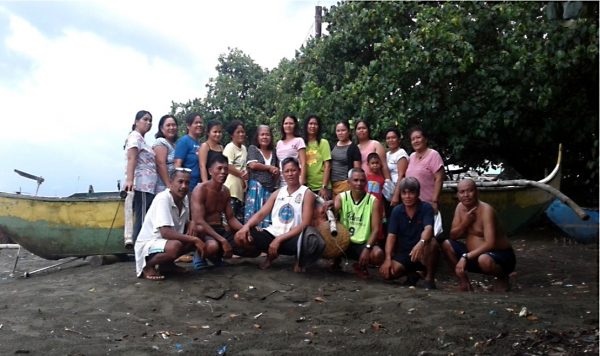
Iwag sa Mananagat Association of Pres Manuel Roxas, Zamboanga del Norte
Members of the group are all housewives of fishermen and construction workers living in the coastal village of Lower Irasan. Most of them come from families with a subsistence income level. During the off-season for fishing and typhoon months, these fishermen have practically no income at all.
Climate change and unabated fishing have taken their toll. In recent years, their fish catch has reduced drastically. Marginal fishers could hardly make both ends meet for their respective families.
With so many idle times, fisherfolk and their wives eventually fall into playing a local card game called “tong its”. This has become a daily routine for idle families.
However, things changed when the Iwag sa Mananagat Association was organized by the local agriculture office. They were registered with the Department of Labor and Employment as a rural workers association on April 17, 2018.
They were enrolled in the DA-SAAD with a proposed egg layer chicken project. They were given 14 modules of “egg machines” with each unit comprising 48 laying pullets, drinkers, feeders, and galvanized cages. The DA-SAAD also provided layer feeds well for the first two months of operation from the date of delivery.
CHALLENGES
A start-up livelihood project, like the layer chicken egg production, must make its niche in the local share for the table egg market.
The odds are a bit in favor of the more established egg producers in the province. The only way the small producers sell their produce is to mobilize all the members to engage in direct selling. The cutting edge of the Iwag sa Mananagat Association is that they produce organic and farm-fresh eggs. They must exploit this and target the health-conscious customers. Clearly, there is a need for better branding and packaging of the eggs produced on the farm.
INNOVATIONS/GOOD PRACTICES
Iwag sa Mananagat has a good approach in handling the project. Unlike any other group under the same project, Iwag doesn’t pay for the caretaker. Instead, they practice the rotational duty of each member to watch over the poultry and feed the chicken day and night. The chicken manure is collected, sun-dried, and utilized as organic fertilizer for their communal vegetable production project.
The group also maintains a communal garden where they can generate a little income out of the vegetables they sell.
RISK-MITIGATION STRATEGIES
The group conducts a regular monthly meeting. It serves as a venue for the group to present updates regarding project management and financial status as well as discuss issues and concerns among members.
The layer chickens produce 20 trays of fresh eggs a day and are able to supply eggs in the community, especially to bakeries. They also already have regular customers. The association experienced difficulty in selling the eggs during the summer season but they were able to manage it through consultation with the Municipal Agricultural Officer. Generally, all eggs are sold every day.
“Cleanliness is next to Godliness.” This is the principle which the association adheres to in the implementation of the project in order to prevent diseases among the layer chickens. “Prevention is better than cure” is another rule they strictly adhere to.
STATUS
Today, the association already has Php 107,028.09 in their bank account. Their savings is one of the conditions set by the program so that the group will be able to sustain the project when DA-SAAD will no longer support them during the termination phase. They will also receive an additional 10 modules of caged layer chicken and for 2019.
IMPACT
Iwag sa Mananagat is just one of the beneficiaries of the program whose lives were changed. From being at the neighbor’s house after the household chores to gossip or to play “tong its” the whole day, they are now productive members of the community.
The wind of change has reversed the daily routine of the housewives. They are now into another form of gambling: they gamble their time tending to their layer chickens with an assured income rather than losing on the gambling table. Their prowess in the numbers game has been utilized in computing daily production and sales of farm fresh eggs.
POLICY/PROGRAMME/COOPERATION/IMPLICATION
Programs like DA-SAAD should be sustained by the government. The community-based livelihood projects may not have the same impact as corporate farming but it can sustain micro-economic activities in far-flung communities. It helps in promoting harmony among community members and at the same time enhances their capacity to contribute to building peaceful and orderly villages.
On behalf of the association, president Jocelyn T. Bulaquena has this to say: “Hinaot unta namolahutay pa ang SAAD Program sa DA aron daghan pang mga pobreng mag-uuma nga parehas namo diri sa Roxas og sa uban pang mga municipio ang ilahang matabangan aron daghan pang mga kinabuhiang molambo. Daghang salamat SAAD.”
Written by Rachel RubioBACKGROUND
Mutia is a 5th class Municipality and is one with the lowest Internal Revenue Allotment from the national government. It also registered a high malnutrition rate among school children. The municipality also registered one of the lowest household incomes in the province. The majority of farmers are small landowners. Most of them are beneficiaries of the Pantawid Pamilyang Pilipino Program (4Ps) cash program of the Department of Social Welfare and Development.
In 2017, the Department of Agriculture under the Special Area for Agricultural Development (SAAD) program started its assistance to marginalized farmers in the poorest provinces in the country.
With the program and the local government unit of Mutia’s vision to empower women’s participation in the community, the Newland Women’s Association was identified as one of the farmer-partners with three other women’s groups for the layer chicken-raising project.
Members of the association received a series of training that included Organizational Development, Project Management, and Financial Management as well as the Policy Formulation Workshop. Technical training on Layer Chicken Raising Management was also given to the women farmer-partners.
Material inputs like the “egg machines” were delivered only after the farmers underwent training. Each module of the “egg machine” is composed of 48 laying pullets, feeder, and drinker with galvanized cage. The DA-SAAD program provided the Newland Women’s Association with ten (10) modules as initial support with layer feeds good for two months of operation, egg trays, and wheelbarrow.
INNOVATIONS/ GOOD PRACTICES
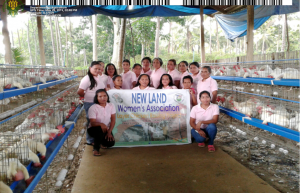
Newland Women’s Association of Mutia, Zamboanga del Norte
The Newland Women’s Association received the components of layer chicken project on June 6, 2018. Every day, three members are assigned to do the feeding/watering of the flocks, harvesting, and sorting of eggs as well as collecting the chicken dungs.
The association was also trained on making carbonized rice hull, lactic acid bacteria serum, and Indigenous microorganisms to minimize foul odor and to prevent flies infestation in the project site.
The association also conducts a feeding program every six months. All malnourished children in the community were given half tray of eggs (15 pcs. eggs) after the feeding.
STATUS
The Newland Women’s Association is now earning from the project given to them. They also have their own bank account, where they deposit their income. As of this time, they already have savings of Php 120,000.00in the bank from their eight modules of layer chicken.
Aside from their income in selling fresh eggs, the association also ventures in vegetable production right in front of their poultry. They are using the chicken dung produced by the layer chicken as a fertilizer to their vegetables.
FACILITATING FACTORS/ CHALLENGES
One of the key factors why this project was successfully implemented was because of the DA-SAAD, LGU Mutia, and barangay local government of Newland’s commitment to supporting our farmer-partners.
It’s a big challenge to the association to compete in the market since their rival is offering a consignment scheme with lower prices to the distributors. But with the advantage of offering fresh eggs, their harvested eggs are always preferred by the consumers especially those who have children studying in elementary and high school.
IMPACT
After a year of operation, members of the Newland Women’s Association enjoyed the fruit of their hard work. The association declared the distribution of dividends for all members. The amount may be negligible but for the lowly women farmers, it meant a lot. Another dividend distribution covering operational income from January to June 2019 will be distributed this July 9, 2019.
The most notable impact for Barangay Newland is the reduction in the number of malnourished children. The association supplements the regular feeding program of the local social welfare office by providing boiled eggs for each malnourished child.
POLICY/PROGRAMME/ COOPERATION IMPLICATION
The layer chicken-raising project is complementing the nutrition program of the barangay. It provides an opportunity for the barangay government to source out farm fresh eggs right at their doorsteps.
As a start-up economic enterprise, the layer chicken project of the association requires sustained government support. Expansion of the project by infusing additional investment for caged layer chicken will eventually expand from a mere subsistence livelihood endeavor into a commercial scale egg enterprise. It will have ripple effects on the neighboring villages that will have enough supply of farm fresh organically produced eggs.
Written by Irish Jean Mallo
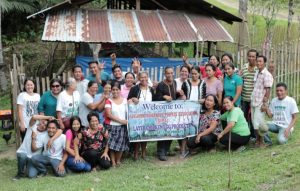
Suisayan Indigenous Peoples’ Association of Manukan, Zamboanga del Norte
BACKGROUND
On top of the hills of Barangay Suisayan in Manukan, Zamboanga del Norte found a thriving, vibrant community of Subanen people ready to meet anyone with their infectious smiles and warm felicitations.
With the untiring efforts of their tribal leader, the Suisayan Indigenous Peoples Association was organized in order for the farmers to engage the mainstream community. The Office of the Municipal Agriculture of Manukanidentified the group as one of the farmer-partners of the Special Area for Agricultural Development (SAAD) Program of the Department of Agriculture (DA).
The association is composed of 25 members from the Subanen tribe who are also registered as beneficiaries of the 4P’s Program of the Department of Social Welfare and Development.
The local agriculture office and the DA-SAAD Program had to exert efforts to convince the association to participate in the DA-SAAD Program because of previous unfortunate experiences. The members of the association expressed their doubts about it as they also experienced sweet promises of livelihood projects but ended up with nothing at all. Worse, the empty promises led to animosity among the members of the tribal community.
All their negative impressions on livelihood projects from government or even those who claimed to be from non-government organizations changed after the DASAAD Program delivered their requested Layer Chicken Project in later part of 2018.
For them, the layer chicken project provided by the DA-SAAD Program became a tool to rebuild relationships among themselves. The project has become a rallying point to collectively address the endemic poverty situation in this far-flung mountain community.
INNOVATIONS/GOOD PRACTICES
The association attended various training that provided the knowledge in managing the project and their organization. The training also taught them the technical-know-how on dealing with chicken manure and eliminating or minimizing the foul odor in the layer chicken house through the IMO (Indigenous Micro-Organism) and carbonized rice hull. After drying the chicken manure, they use it in their backyards for gardening plants and even in the coconut trees.
The association has a regular monthly meeting and regular rotation of work. Each member has a role to play and responsibilities to undertake.
STATUS
Even in its early operational stage, the layer chicken project registered very promising results. The layer chicken egg production has peaked to 94% in April 2019 and maintained the average production rate of 87% per month since then.
The collective effort of the association significantly contributed to the well-maintained layer chicken production area. Chicken manure is collected and dried daily. They use the dried chicken dung as fertilizer to their existing fruit trees and other cash crops.
FACILITATING FACTORS/CHALLENGES
The water source, rough road, and the location’s proximity to the market channels were the association’s challenges.
Water supply is still a big challenge as the nearest source of potable water for the laying pullets is about 500 meters downhill. However, this does not dampen the spirit of the members to fetch water daily and bring it uphill to the project site.
Meanwhile, the DASAAD Program has already conducted an inspection of the water source near the project site. A detailed engineering design has been prepared. The local agriculture office has been requested to put up counterpart funds for the spring development.
Selling eggs all the way from the peak of the hill is not an issue but a driving force to exert more effort to penetrate the market. Using their one and only improvised “skylab” motorcycle as a delivery vehicle, the farmer-partners reached as far as Jose Dalman in the nearby municipality. Eggs are sold as well in adjacent far-flung barangays; finding its way to the local market in the geographically isolated and disadvantaged areas.
IMPACT
The association worked as one by registering their association in the Department of Labor and Employment. They have also started to believe that despite their remoteness and their race, the government is there to help them.
The association is also producing organically grown vegetables as their additional income. The project also aims to hit two birds in one stone: addressing poverty and malnutrition at the same time.
